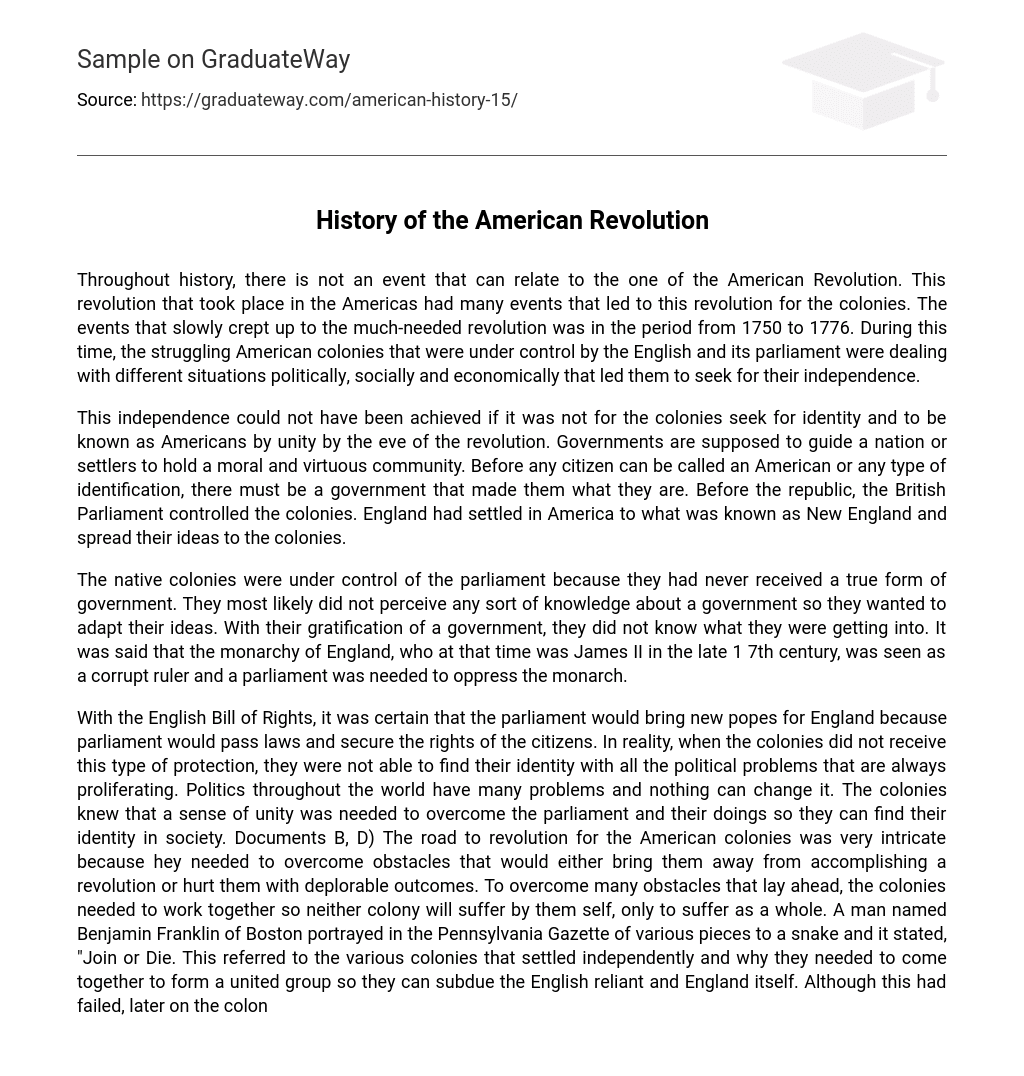Spanning from 1750 to 1776, the American Revolution stands out as a unique and transformative event in history. It brought about numerous events that paved the way for the colonies’ revolution in the Americas. These events, encompassing political, social, and economic aspects, unfolded gradually and ultimately compelled the struggling American colonies, under English control and parliamentary rule, to aspire for independence.
The colonies’ quest for identity and aspiration to be recognized as Americans through unity was crucial for the attainment of independence. Governments play a crucial role in directing a nation or settlers towards establishing an upright and principled community. In order for individuals to be identified as Americans or with any specific identity, a governing body must exist to shape their collective identity. Prior to the establishment of the republic, the British Parliament held authority over the colonies, with England settling in what was referred to as New England and disseminating their ideals to the colonies.
The native colonies, lacking a proper government and understanding of governance, were under parliamentary control. They desired to embrace new concepts of government without fully comprehending the potential consequences. During the late 17th century, England’s monarchy, led by James II, was seen as corrupt. As a result, there arose a necessity for a parliament to curtail the monarch’s authority.
The English Bill of Rights ensured that the parliament would enact laws to protect the rights of citizens, which included finding new solutions for England. However, when the colonies did not receive this same protection, they struggled to establish their identity amidst ongoing political issues. The challenges faced by the colonies on their path to revolution were complex and could either hinder their progress or lead to unfavorable consequences. To overcome these obstacles, unity among the colonies was crucial so that no individual colony would suffer alone but rather as a collective entity. Benjamin Franklin used an analogy in the Pennsylvania Gazette, portraying various pieces of a snake coming together and stating “Join or Die.” This symbolized the need for independent colonies to unite in order to confront England’s dependence on them and assert themselves as a united force.Despite the initial failure, the colonies eventually unite due to the influence of George Greenville, who was the British Secretary of Treasury and implemented severe policies to address England’s debt. As a result of their unity, they recognized the need for a governing system that would guide them towards prosperity.
The Stamp Act and the Quartering Act, among other acts, were opposed and rejected by the first continental congress. This congress comprised representatives from the colonies and aimed to protect the rights and freedoms of the colonial people and reduce the burden of new taxes imposed on them.
The city of Boston experienced significant events that greatly affected it. These events included the Boston Massacre (1770), during which British troops assaulted a crowd in Boston who were against parliament, and the Boston Tea Party (1773), when citizens of Boston boarded a ship transporting tea from the British East India Company and disposed of all the tea leaves into the water. The unity among the colonies was crucial for Boston’s survival because they had to endure enormous financial burdens caused by the loss of tea and possible land reparations resulting from British invasion.
Many colonies showed sympathy and provided goods to support Boston in its recovery from the redcoats. The united colonies collaborated to establish a collective identity prior to the declaration of independence (Documents A, G, C). As the united colonies approached the American Revolution, troops prepared for war. This marked the first instance of united colonists fighting together towards a common objective: independence for the colonies.
The troops were led in a fight against the British in order to prevent the parliament from revealing corruption to the citizens and to regain their freedoms. The diverse settlers in America had numerous disagreements, particularly regarding land, resources, and money, before eventually uniting. One example of this was the conflict between Indian tribes and New England over land. However, this issue became insignificant to both sides as they unified, as described in an article by Benjamin Gazette.
When the Dutch, French, Spanish, and English ethnics united, it resulted in social equality. As Americans, they had a common identity and were determined to fight for their freedom, liberties, properties, government, and most importantly, independence. They acknowledged the importance of their unity as they stood resilient during the revolution’s peak. (Documents H, E)
As the colonies neared the onset of the American Revolution, they had numerous lessons to learn in order to establish their position in the world. The control exerted by the English parliament over the original colonies led to a multitude of issues. The imposition of various taxes, including stamp and sugar taxes, posed significant challenges. These obstacles, among others, could only be overcome if the colonies united and embraced their identity as citizens of America. Ultimately, the Americans succeeded in initiating a much-needed revolution that allowed them to embark on a new life with newfound independence.





